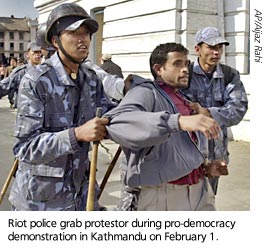New York, February 1, 2006—The Committee to Protect Journalists condemns the beating and arrest of journalists Wednesday in demonstrations to mark one year since King Gyanendra seized absolute power and restricted media freedoms in Nepal.
Local journalists told CPJ police used water cannon and batons to break up a protest in the capital Kathmandu. At least 30 journalists were detained and several beaten by police, they said.
“Journalists in Nepal have every reason to protest the king’s continued campaign of intimidation against the independent press,” said CPJ Executive Director Ann Cooper. “Instead of using force to prevent these demonstrations King Gyanendra should rescind repressive media regulations introduced in the past year, and allow the press to fulfill its obligations to provide news and information to the people of Nepal.”
The Federation of Nepalese Journalists (FNJ), an umbrella group, organized the nationwide demonstrations to mark the first anniversary. Among those detained were veteran journalists Kanak Mani Dixit and Harihar Birahi, and FNJ president Bishnu Nisthuri. “We’re out, thirty of us journalists who were water-cannoned and charged and then taken in,” Dixit told CPJ shortly after being released. Journalist Ramesh Bista was hospitalized with a knee injury and Bijaya Sivakoti was struck in the head, according to the FNJ and local news reports.
In eastern Nepal’s Jhapa district, police arrested another 30 journalists as they prepared to protest, according to the FNJ and The Himalayan Times. It was unclear whether those journalists had been released.
The king dismissed a multi-party government on February 1, 2005 saying emergency measures were needed to control a Maoist insurgency. He promised international allies and donors that press restrictions would be temporary but the crackdown on the media has continued into 2006.
Security forces occupied major media houses, cut communications and silenced private FM radio news stations a year ago. Some media freedoms have been restored since the king lifted a state of emergency in April 2005, but new regulations banning private FM radio news broadcasting and increasing jail time for defamation charges remain on the books.
Read a press release by the International Mission for Press Freedom and Free Expression in Nepal on the first anniversary of the royal coup.
